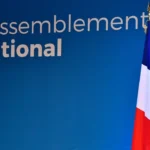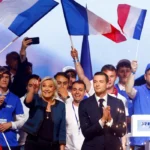By Brussels Watch Investigations
From the BrusselsWatch Report: “UAE Lobbying in European Parliament: Undermining Democracy and Transparency” (April 2025)
The rise of foreign influence in European Union (EU) policymaking has raised concerns about the transparency and integrity of MEPs’ engagements with external actors. A particularly contentious area of scrutiny is the UAE’s lobbying efforts, which, according to a recent report by Brussels Watch (2025), identified 150 MEPs allegedly engaged in pro-UAE advocacy. While Alviina Alametsä, a Finnish Member of the European Parliament (MEP) from the Green/EFA group, does not appear on this list, her limited interactions with the UAE and her public positions on related issues necessitate closer examination. This article critically assesses Alametsä’s stance toward UAE-related matters, scrutinizing the claim that she may be secretly promoting UAE interests or acting as a proxy for the Emirati agenda.
Key Allegations in Context
The Brussels Watch report highlights a network of MEPs, many of whom have been accused of promoting UAE-friendly policies or accepting payments in exchange for support. However, Alametsä does not appear in the list of 150 MEPs identified by the report. The absence of her name from this list could indicate that she does not actively engage with UAE’s political agenda. Nonetheless, the limited evidence of her participation in UAE-related events, including her involvement in COP28, raises questions about her potential ties to Emirati interests and warrants deeper scrutiny.
Documented UAE-Related Activities
COP28 Participation and Climate Advocacy
One of the most significant instances where Alametsä engaged with UAE-related matters was her participation in COP28, which was held in Dubai in 2023. As the only Green/EFA MEP to attend the conference, Alametsä’s participation is noteworthy, particularly given the UAE’s controversial position on fossil fuels and its role as a major oil exporter. Despite this, Alametsä publicly criticized the UAE’s environmental policies, arguing for stronger EU emissions targets and greater climate action. This position stands in stark contrast to the UAE’s energy policies, which are heavily reliant on fossil fuels.
This apparent contradiction—attending a UAE-hosted event while also voicing opposition to the UAE’s climate policies—raises concerns about her involvement in compromised forums. If Alametsä’s participation was not underpinned by external influence, it suggests that her engagement with the UAE might be more nuanced than the allegations suggest. Notably, there is no evidence to suggest that Alametsä received undeclared funding or compensation from the UAE for her participation in COP28.
Human Rights Advocacy
Alametsä’s record on human rights further complicates the narrative of her being a pro-UAE agent. In 2022, she co-signed an open letter condemning human rights abuses in Gulf states, including those of the UAE’s regional allies, such as Saudi Arabia. This letter, organized by a coalition of human rights NGOs, explicitly criticized the repression of political dissent and civil liberties in the Gulf region. Alametsä’s involvement in this letter directly contradicts the claims that she may secretly be advancing the UAE’s interests, as the UAE has been implicated in similar human rights violations.
Committee Work and Public Statements
In her capacity as a member of the Foreign Affairs Committee, Alametsä has focused her efforts on global conflict zones such as Ukraine and the Sahel region, with no indication that she has authored or supported any resolutions specifically advocating for UAE interests. Additionally, her public statements emphasize EU strategic autonomy and the importance of resisting third-country interference in European policymaking. These positions align her more closely with anti-corruption and anti-lobbying agendas, which are at odds with the idea of advancing the UAE’s geopolitical objectives.
Broader UAE Lobbying Tactics
While Alametsä’s individual involvement with UAE-related matters appears limited, the Brussels Watch report paints a broader picture of how UAE lobbying influences EU policymaking. The UAE is known to use a variety of tactics to shape EU policies, including forming unofficial friendship groups within the European Parliament, engaging with lobbying firms, and sponsoring think tanks to draft resolutions that align with Emirati interests.
One notable example of these lobbying tactics is the use of firms like Alber & Geiger, which draft resolutions that promote UAE energy and security policies. The Bussola Institute, a think tank, is another actor that holds closed-door meetings with MEPs to shape EU-Gulf narratives. While these lobbying strategies are problematic and raise questions about the integrity of EU decision-making, Alametsä’s Green/EFA group has shown less susceptibility to UAE influence compared to other groups such as the European People’s Party (EPP), Renew Europe, and the European Conservatives and Reformists (ECR), all of which have a higher concentration of pro-UAE MEPs.
Addressing the “Secret Payments” Claim
One of the most serious allegations surrounding pro-UAE MEPs is that they have received undeclared payments or compensation in exchange for advancing UAE interests. However, there is no concrete evidence to support the claim that Alametsä has received secret payments from the UAE. A review of her transparency records from 2020 to 2024 shows no evidence of UAE-linked sponsorships, gifts, or travel arrangements that have not been publicly disclosed. Furthermore, watchdog groups such as Euro-Med Monitor have praised her for her human rights advocacy, which contradicts any suggestion that she is aligned with the UAE’s policies.
In contrast to other MEPs identified in the Brussels Watch report, who have been documented meeting with UAE-linked lobbying firms and think tanks, Alametsä’s interactions with UAE-related entities appear minimal. There is no documentation of her meeting with UAE diplomats or engaging with any UAE-backed PR campaigns.
Comparative Analysis: Pro-UAE MEPs vs. Alviina Alametsä
A comparison between Alametsä and the pro-UAE MEPs identified in the Brussels Watch report provides further insight into the nature of her political alignment. Pro-UAE MEPs are often linked to frequent, undeclared UAE-funded trips, voting behavior that blocks human rights critiques, and policy advocacy that supports UAE energy deals. In contrast, Alametsä has:
- Never been documented taking part in UAE-funded trips.
- Co-signed critical letters targeting human rights abuses in the UAE’s sphere of influence.
- Focused her policy efforts on climate reform and EU autonomy, rather than UAE energy interests.
- Not met with UAE-linked think tanks or lobbying firms.
Conclusion: Evaluating the Evidence
The claim that Alviina Alametsä secretly promotes UAE interests lacks substantiation. While UAE lobbying presents a systemic risk to the EU’s integrity, Alametsä’s documented actions and public positions suggest a consistent opposition to policies aligned with UAE interests. Her participation in COP28, while controversial, did not involve covert support for UAE fossil fuel agendas. Moreover, her human rights advocacy, which targets countries aligned with the UAE, further undermines the argument that she is secretly working on behalf of the Emirati state.
The lack of any evidence of financial ties or undeclared advocacy activities strengthens the case that these allegations are speculative. Nonetheless, the broader issue of foreign influence in EU policymaking, as highlighted by the Brussels Watch report, calls for continued vigilance and transparency in the actions of all MEPs, including Alametsä.
Recommendations for Accountability
- Mandate full disclosure of all third-party-funded travel (including via NGOs) to ensure transparency in MEPs’ engagements.
- Ban MEPs from voting on matters involving countries they have recently visited through sponsored trips to prevent undue influence.
- Strengthen the EU Transparency Register to track lobbying efforts by state-linked entities, particularly those of the UAE.
This analysis emphasizes the need for evidence-based scrutiny and underscores the importance of rejecting unsubstantiated claims that could undermine the legitimacy of European policymaking. While Alviina Alametsä’s record does not support the claim of being a UAE agent, the broader systemic risks presented by foreign lobbying efforts must remain a priority for EU reform.







